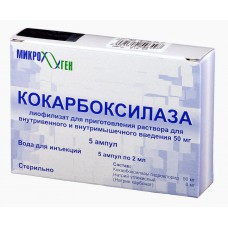Expiration date: 04/2026
Clinical and pharmacological groups
Vitamins (to be added to the parenteral nutrition solutions)
A drug that improves the metabolism and energy supply of tissues)
(A drug with a tonic effect)
Pharmacological action
A coenzyme formed in the body from thiamine. It has a metabolic effect, activates tissue metabolism. In the body, it is phosphorylated to form mono -, di -, and triphosphate esters, cocarboxylase is part of enzymes that catalyze the carboxylation and decarboxylation of ketoacids, pyruvic acid, and promotes the formation of acetyl-coenzyme A, which determines its participation in carbohydrate metabolism. Participation in the pentose cycle indirectly contributes to the synthesis of nucleic acids, proteins and lipids.
It improves glucose uptake, nervous tissue trophism, and helps to normalize the functions of the cardiovascular system.
Cocarboxylase deficiency causes an increase in the level of pyruvic and lactic acids in the blood, which leads to acidosis and acidotic coma.
Dosage
Adults are administered in / m or in / V. the Dose is 50-200 mg/day. In diabetes mellitus (acidosis, coma), the daily dose may be 0.1-1 g. the Frequency and duration of use depends on the indications.
Children-in / m, in / in (drip or jet), newborns-sublingually. Children under 3 months - 25 mg/day, from 4 months to 7 years-25-50 mg/day, from 8 to 18 years-50-100 mg / day. The duration of treatment is from 3-7 to 15 days.
Drug interaction
Increases the cardiotonic effect of cardiac glycosides and improves their tolerance.
Side effect
Possible: allergic reactions (hives, itching).
In / m administration: possible hyperemia, itching, edema at the injection site.
Indications
As part of the combination therapy: metabolic acidosis, acidosis in hyperglycemic coma, acidosis in respiratory and pulmonary heart failure, chronic heart failure, IHD, unstable angina, myocardial infarction, postinfarction cardiosclerosis, hepatic and/or renal failure, acute and chronic alcoholism, poisoning, intoxication with cardiac glycosides and barbiturates, infectious diseases (diphtheria, scarlet fever, typhoid fever, paratyphoid fever), neuralgia, multiple sclerosis, peripheral neuritis.
In infants: perinatal hypoxic encephalopathy, respiratory failure, pneumonia, sepsis, hypoxia, acidosis.
Contraindications
Hypersensitivity to cocarboxylase.






